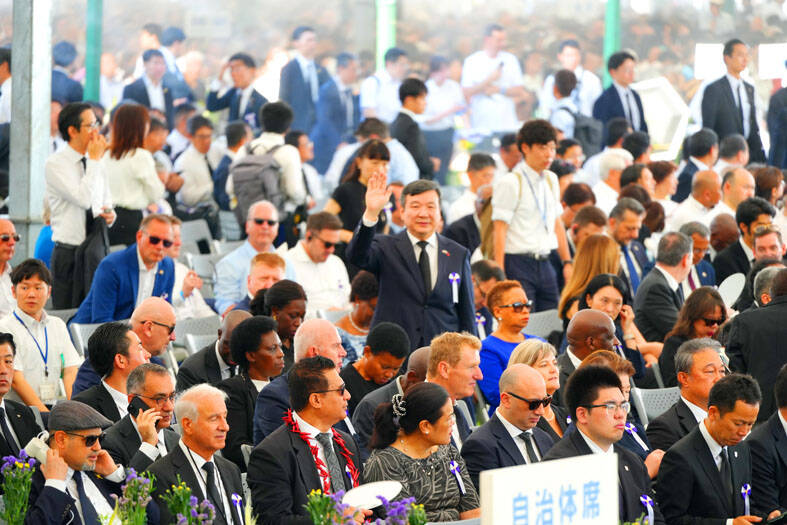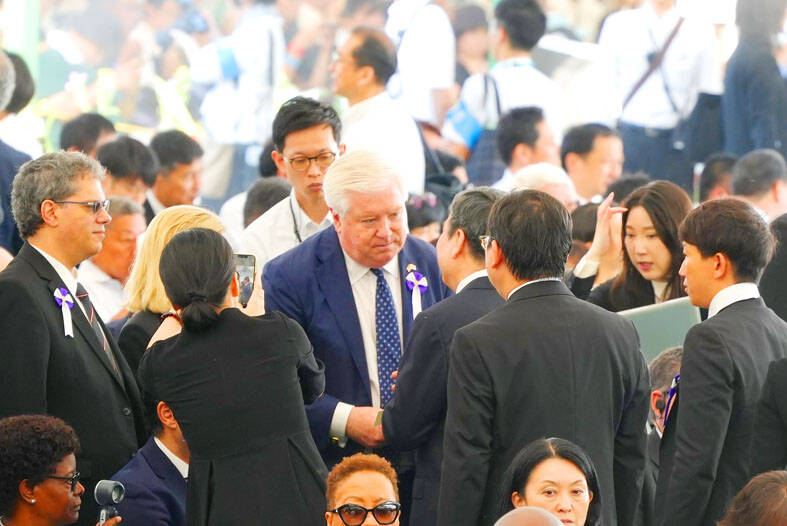A delegation led by Representative to Japan Lee Yi-yang (李逸洋) yesterday attended the Hiroshima Peace Memorial Ceremony, marking the first time an official Taiwanese delegation has participated in the annual ceremony.
Lee, Taipei Economic and Cultural Representative Office in Osaka Director-General Hung Ying-chieh (洪英傑) and office staff attended the ceremony at Peace Memorial Park in the morning as special guests of the city.
About 55,000 people, including representatives from 120 countries and regions, as well as Japanese Prime Minister Shigeru Ishiba and Hiroshima Mayor Kazumi Matsui, also attended the ceremony.

Photo: CNA
At 8:15am, the time that the US dropped an atomic bomb on the city in 1945, the Peace Bell rang and sirens sounded across the city, and a minute of silence was held to honor those who died as a result of the bombing.
Lee told a news conference after the ceremony that attending was meaningful, as it was the first time Taiwan was invited to attend since it was first held in 1947.
He expressed gratitude to the city for the invitation and said that his delegation’s participation symbolized Taiwan’s close connection with international society.

Photo: CNA
When the bomb hit, many Taiwanese studying or working in Japan suffered, so many Taiwanese resonate with the incident, he said, adding that Taiwan respects Hiroshima’s desire that nuclear weapons be abolished and lasting world peace be established.
Lee said that Taiwan has maintained a strong relationship with Hiroshima, including after the city in 1982 founded Mayors for Peace, a worldwide organization of local governments working for the realization of a world without nuclear weapons.
The network had 8,509 member cities as of Friday last week, with Taipei, Tainan, Kaohsiung and Taichung among them, he said.
The Taiwan friendship groups of the Hiroshima City and Hiroshima Prefecture councils have promoted the bilateral relationship and support Taiwan’s international participation, Lee said.
The city council in December 2022 issued a statement supporting Taiwan’s bid to join the Comprehensive and Progressive Agreement for Trans-Pacific Partnership, while the prefectural council in the same month issued a statement supporting Taiwan’s participation in the WHO, he said.
The international community in the past few years has been paying close attention to the situation across the Taiwan Strait, with many countries speaking out in defense of Taiwan, while “maintaining peace and stability across the Taiwan Strait” has become an international consensus, he said.
“Taiwan is a country that cherishes peace. We believe that only by bravely facing aggression can real peace be protected,” he said, adding that it is vital for countries that share the values of freedom and democracy to stand together and stop the ambition of aggressors.
Taiwan would continue to cooperate with Japan, the US and other democracies to counter the expansion of authoritarianism, and uphold peace, stability and sustainable development in the Indo-Pacific region, he added.
In Taipei, Ministry of Foreign Affairs spokesman Hsiao Kuang-wei (蕭光偉) said that Taiwan’s first attendance at the ceremony was especially meaningful.
The ministry expresses its sincere gratitude to Japan for the invitation and arrangements, Hsiao said.
The ceremony underlined the core values of freedom, democracy, peace and human rights, which are in line with values-based diplomacy — one of the three pillars of the “integrated diplomacy” strategy promoted by Minister of Foreign Affairs Lin Chia-lung (林佳龍), he said.
The Nagasaki Peace Memorial Ceremony on Saturday would also be attended by Lee, along with Chen Ming-chun (陳銘俊), head of the Taipei Economic and Cultural Office in Fukuoka, Hsiao said.

CHAOS: Iranians took to the streets playing celebratory music after reports of Khamenei’s death on Saturday, while mourners also gathered in Tehran yesterday Iranian Supreme Leader Ayatollah Ali Khamenei was killed in a major attack on Iran launched by Israel and the US, throwing the future of the Islamic republic into doubt and raising the risk of regional instability. Iranian state television and the state-run IRNA news agency announced the 86-year-old’s death early yesterday. US President Donald Trump said it gave Iranians their “greatest chance” to “take back” their country. The announcements came after a joint US and Israeli aerial bombardment that targeted Iranian military and governmental sites. Trump said the “heavy and pinpoint bombing” would continue through the week or as long

TRUST: The KMT said it respected the US’ timing and considerations, and hoped it would continue to honor its commitments to helping Taiwan bolster its defenses and deterrence US President Donald Trump is delaying a multibillion-dollar arms sale to Taiwan to ensure his visit to Beijing is successful, a New York Times report said. The weapons sales package has stalled in the US Department of State, the report said, citing US officials it did not identify. The White House has told agencies not to push forward ahead of Trump’s meeting with Chinese President Xi Jinping (習近平), it said. The two last month held a phone call to discuss trade and geopolitical flashpoints ahead of the summit. Xi raised the Taiwan issue and urged the US to handle arms sales to

BIG SPENDERS: Foreign investors bought the most Taiwan equities since 2005, signaling confidence that an AI boom would continue to benefit chipmakers Taiwan Semiconductor Manufacturing Co’s (TSMC, 台積電) market capitalization swelled to US$2 trillion for the first time following a 4.25 percent rally in its American depositary receipts (ADR) overnight, putting the world’s biggest contract chipmaker sixth on the list of the world’s biggest companies by market capitalization, just behind Amazon.com Inc. The site CompaniesMarketcap.com ranked TSMC ahead of Saudi Aramco and Meta Platforms Inc. The Taiwanese company’s ADRs on Tuesday surged to US$385.75 on the New York Stock Exchange, as strong demand for artificial intelligence (AI) applications led to chip supply constraints and boost revenue growth to record-breaking levels. Each TSMC ADR represents

Pro-democracy media tycoon Jimmy Lai’s (黎智英) fraud conviction and prison sentence were yesterday overturned by a Hong Kong court, in a surprise legal decision that comes soon after Lai was jailed for 20 years on a separate national security charge. Judges Jeremy Poon (潘兆初), Anthea Pang (彭寶琴) and Derek Pang (彭偉昌) said in the judgement that they allowed the appeal from Lai, and another defendant in the case, to proceed, as a lower court judge had “erred.” “The Court of Appeal gave them leave to appeal against their conviction, allowed their appeals, quashed the convictions and set aside the sentences,” the judges